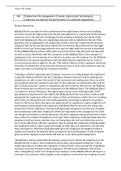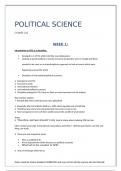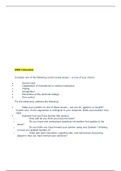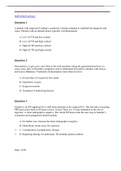I - What is competition law: function and rationale
Functions of competition law
Competition law is a tool to ensure that companies operating in a free market economy do
not prevent the market from functioning optimally through anti-competitive behaviour.
Governments can also distort competition, therefore in the EU, competition rules are made
that apply to the activity of the government. There can be legitimate reasons for
governments to intervene such as market failure however such intervention may not distort
competition and cannot go beyond what is necessary to achieve certain public interest.
These competition rules for governments ensure that governments do not give “advantages”
to their own public enterprises so they do not distort competition.
So EU competition law both applies to private and state-owned enterprises.
Competition law can be seen as a tool of market regulation, as a manifestation of economic
policy, because it is built on the fundamental belief that if companies fiercely compete with
each other that that is actually beneficial for us. If we protect competition, we get lower
prices for consumers, higher output, better quality and better innovation.
This economic theory is nice however the scope of state intervention; hands off approach or
regular intervention. These ideas have changed over time, whenever the market evolves, the
competition rules evolve. However the common principle is the efficient market ideal.
The first jurisdiction to adopt a ‘modern’ system of competition was the US Sherman Act
1980, it was a consolidation of undertakings, they brought their interests together in a legal
vehicle called ‘trusts’, ‘cartels’. This was a populist instrument, it was used to protect smaller
businesses from larger enterprises, to distribute wealth and power.
Competition law itself is not an end but a means to ensure that a society based upon a free
market economy functions properly, you protect the competition for other objectives.
- You can have a narrow conception of objectives (outcome): promoting efficient
markets and maximising welfare (Chicago School, US). So if something does not
increase prices or does not lower output we should not be concerned because we’re
only concerned with economic welfare.
- You also have the broad conception of objectives structure and process): including
protecting the rights of individuals to participate in the market (ordoliberalism),
fairness… But also survive to other public policy objectives.
The reason we care about market integration is because we have an internal market in the
EU, there’s a free movement of goods between national markets. Competition law is used in
the EU to ensure the establishment of the internal market, to promote market integration.
The economic rationale of competition law
We believe that the good function of the market heals economic efficiencies. The
fundamental rationale is that the abuse of market (unilateral or collective) frustrates the
efficient working of a market.
,In a perfectly competitive market (which does not exist), there are no barriers but assuming
there is, it yields allocative efficiency. All the available resources in the economy are used in
response to the consumer's demand, so we produce the amount consumers want and
consumers pay the price they want to pay. It also produces productive efficiency, they
produce their goods and services at the lowest possible costs. Dynamic efficiency is
innovation, it is believed that competitive markets are not only productive but also have the
best incentive for (technological) invention.
II - EU competition law: branches
EU competition law
EU competition law consists of 5 branches, art. 101-109 TFEU.
Competition rules applicable to private market operations, undertakings:
- art. 101 TFEU: prohibition of restrictive agreements or other collusive practices
between independent market operations → collusive behaviour
- art. 102 TFEU: prohibition of abuse of dominant economic position → unilateral
behaviour.
- European Union Merger Regulation, EUMR: prohibition of mergers and acquisitions
that would significantly impede effective competition in the internal market
Competition rules applicable to State measures:
- Art. 106 TFEU: public undertakings, undertakings granted special or exclusive rights,
undertakings entrusted with services of general economic interest (SGEI).
- art. 107-109 TFEU: state aid control (economic support measures the state gives to
certain undertakings)
III - EU competition law: scope of application & enforcement
Scope of application for EU competition law
In all cases you need to determine whether there’s an undertaking and if it appreciably
affects trade between the Member States.
Undertakings (1) - entity
From Case Höfner it was determined that the functional interpretation of the undertakings,
which is that it must be an entity and it needs to be engaged in economic activity. If you have
those, you are an undertaking.
The legal form of an entity is irrelevant, it can be anything.
Important to note is the single economic unit doctrine, the parent company and subsidiary
are considered to form 1 undertaking if the subsidiary has no real autonomy to determine its
course of action on the market, so when the parental company has the decisive influence on
the subsidiary and it merely carries out instructions issued by the parent company controlling
it. From Case Akzo Nobel, the presumption can be derived that when a parent company
exercises decisive influence, it is liable. It has 2 purposes, one to find the perpetrator and
secondly to determine the liability.
, Undertakings (2) - economic activity
The offering of goods or services on the market and activity could, at least in principle, be
carried on by a private undertaking in order to make profits. There are 3 exception to
economic activity:
1. exercise of public power: essential functions of the State → Case MOTOE
2. solidarity-based social security schemes, such as healthcare or insurance (input is
not related to output) → everybody pays the same but some benefit more than the
other, so it’s a scheme.
3. public education (organised within the national education system funded and
supervised by the State) and research activities.
Examples
Universiteit leiden can be considered an undertaking because it’s an entity and engages in
economic activities, it sells coffees and merchandise.
The Dutch Bar Association can be considered an undertaking and not, because just as a
regulation it’s not an undertaking however when it’s hosting seminars it can be considered
an undertaking since it engages in economic activity.
Ajax is an undertaking, it’s an entity and engages in economic activity, the selling of tickets
and the engagement in the transfermarket.
Nephews selling baked goods, also an undertaking since they are engaged in the economic
market.
Effect on trade between Member States - cross border dimension
EU law does not regulate conduct confined within a single Member State, which falls under
national competition laws.
An agreement affects trade if it can potentially threaten the freedom of trade between
Member States, whether directly or indirectly, as established in the Consten Grundig case.
The Commission's guidelines provide criteria for assessing whether an agreement affects
trade between Member States. This includes sufficient probability based on objective factors,
direct or indirect influence, and the effect on trade patterns between Member States. For
example, local sports facilities and small airports serving predominantly local users typically
do not affect trade between Member States.
The Commission's guidelines provide criteria for assessing whether an agreement affects
trade between Member States. This includes sufficient probability based on objective factors,
direct or indirect influence, and the effect on trade patterns between Member States. For
example, local sports facilities and small airports serving predominantly local users typically
do not affect trade between Member States. The assessment is based on the type of
product/service and the nature of the agreement/practices.
A joint market share of at least 5% and turnover over 40 million euros can indicate an effect
on trade, but this is rebuttable. These guidelines are detailed in the Commission Notice on
the effect on trade concepts contained in Articles 81 and 82 of the Treaty, specifically in
paragraph 52.










